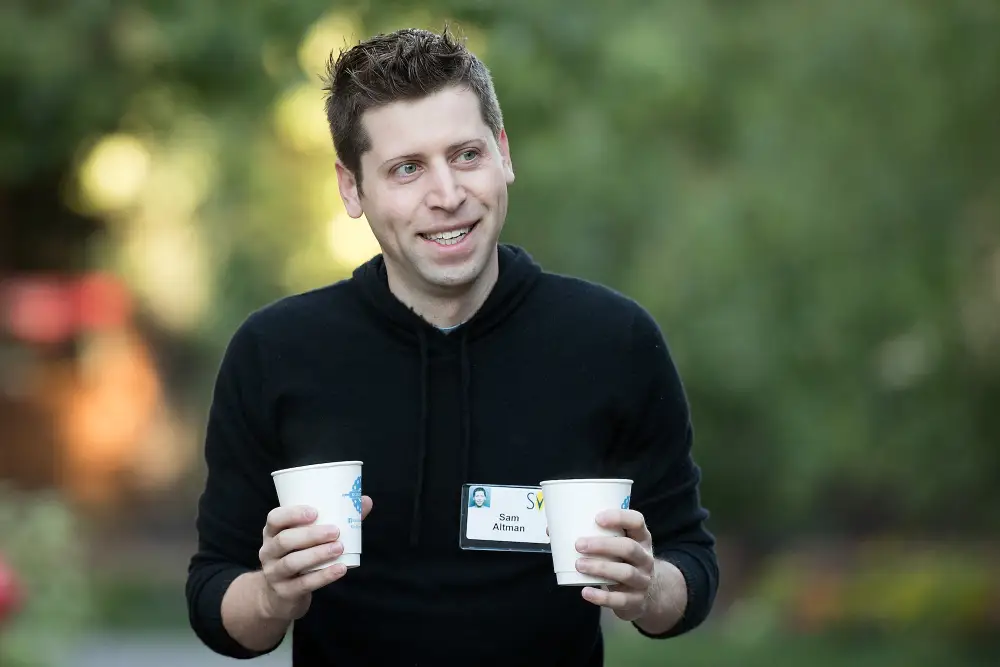He was a tech prodigy before leaving primary school, dropped out of one of America’s top universities, and now appears to be at the helm of a revolution that has the potential to change our lives forever. Who is Sam Altman?
OpenAI’s Sam Altman, like so many of the billionaire entrepreneurs who have emerged from that infamous stretch of sunny California, appears to be on his way to becoming a household name.
Before the launch of his firm’s breakthrough chatbot ChatGPT, the fresh-faced 38-year-old would have been unknown to most outside tech circles, but he now spends much of his increasingly valuable time rubbing shoulders with world leaders and some of America’s most recognizable executives.
Who is Sam Altman?
His path to becoming “a remarkable figure in the realm of innovation and entrepreneurship” (those are ChatGPT’s words when asked for an introduction to its chief creator, not mine) began at his childhood home in Missouri, where eight-year-old Altman was gifted his first computer, quickly learning not just how to use it, but to program for it.
Altman attended John Burroughs School in St Louis and told The New Yorker in a 2016 interview that having his computer helped him come to terms with his sexuality and come out to his parents when he was a teenager.
“Growing up gay in the Midwest in the 2000s was not the most awesome thing,” he recalled. “And finding AOL chatrooms was transformative. Secrets are bad when you are 11 or 12.”
With high school out of the way, it was time for university – Stanford, no less. Altman enrolled at that illustrious California university to study computer science, but dropped out after only two years, following in the footsteps of previous dropouts-turned-tech-stars Bill Gates and Mark Zuckerberg, who both abandoned their Harvard degrees before becoming two of history’s most influential CEOs.
Abandoning a prized spot at one of America’s top universities appeared to be such a rite of passage for the country’s leading tech entrepreneurs that it played right into the success story of the now-disgraced Elizabeth Holmes, whose departure from Stanford to gatecrash Silicon Valley sparked a wave of media attention similar to that which Altman is currently receiving.
His first post-university venture was Loopt, a smartphone app that allowed users to selectively share their real-time location with others. The company was founded with $30 million (£24 million) in funding from Y Combinator, a start-up accelerator firm that has helped establish internet companies such as Airbnb and Twitch.
Altman became president of Y Combinator itself in 2014, after the sale of Loopt for $44m (£35m) in 2012. He also founded his own venture capital fund called Hydrazine Capital, attracting enough investment to be named on the Forbes 30 Under 30 list for venture capital. As if he wasn’t busy enough, Altman also ran Reddit for a grand total of eight days amid a leadership shake-up in 2014, describing his tenure as “sort of fun”.
The rise of OpenAI
While his time at the top of Reddit only lasted eight days, his oversight of OpenAI has now lasted eight years. He’s “doing pretty well” with it, he said in a February tweet (certainly compared to Loopt, which, he now says, “sucked”).
i failed pretty hard at my first startup–it sucked!–and am doing pretty well on my second.
the thing i wish someone told me during the first one is that no one else thinks about your failures as much as you do, and that as long as don’t psych yourself out you can try again.
— Sam Altman (@sama) February 5, 2023
In 2015, he co-founded the company with Elon Musk (who was only running SpaceX and Tesla at the time), with the two men providing funding alongside Amazon and Microsoft totaling $1 billion (£800 million).
It was run as a non-profit with the noble goal of developing AI without wiping out humanity.
So far, mission accomplished; however, if Altman is to be believed, the risk has since become very real.
During his tenure, OpenAI ceased to be a non-profit and is now valued at up to $29 billion (£23 billion), owing to the phenomenal success of its generative AI tools, ChatGPT for text and DALL-E for images.
Microsoft CEO Satya Nadella has called Altman an “unbelievable entrepreneur” who “bets big and bets right,” which OpenAI’s success proves.
Also read: What is ChatGPT-4 and how to use it?
ChatGPT gathered tens of millions of users within weeks of its launch in late 2022, astounded experts and laypeople alike with its ability to pass the world’s most difficult exams, get through job applications, compose anything from political speeches to children’s homework, and write its own computer code.
Suddenly, the concept of a large language model (meaning it is trained on massive amounts of text data to understand our requests and respond appropriately) became something of a mainstream buzz term, prompting Microsoft to invest more money in OpenAI and incorporate the technology into its Bing search engine and Office apps.
Google got in on the act with its Bard chatbot, some of China’s biggest tech companies joined the race, and Musk, who left OpenAI in 2018 due to a conflict of interest with Tesla’s work on self-driving AI, has said he wants to launch his own.
Meanwhile, OpenAI’s technology is improving, with an upgrade dubbed GPT-4 released within months of ChatGPT’s release demonstrating how quickly these models can evolve.
